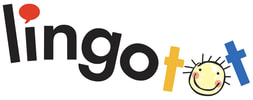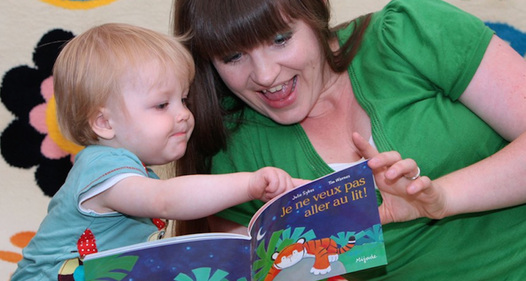| There have been some reports in the press this week that bilingual babies show signs of cognitive advantage. It doesn't matter which language they hear and it shows up by 6 months of age! I have always believed the best time to start introducing a second language is when your child is a baby. |
Very young children will pick up the language in the same way as they learned their mother tongue, naturally and easily. Think of it this way: When a baby is born, it has no idea where in the world it is going to arrive. It’s brain is lovely and flexible, ready to soak up any new language is hears. At about the age of 8-10 months, the baby then starts to “tune in” to the language(s) it hears around him/her. This means that foreign language sounds which do not exist in the mother tongue, start to be “tuned out” ever so gradually. You can read more about this here.
Many experts do agree that there seems to be an ‘optimal’ time period for learning a second language: from birth to three years. In other words, right when a child is learning the first language. The time when his/her mind is still open and flexible.
The latest research released this week backs this up and has been widely reported in the UK press. The Independent newspaper reported last week that "the benefits of growing up in a bilingual home start early and are broader than previously thought, new research shows. At just six months old, infants who are exposed to more than one language have an edge over their monolingual peers." in their article entitled "Bilingual babies benefit from learning faster".
Similarly the Daily Mail's article "Want your child to be clever? Teach them two languages: Study finds bilingual babies often show signs of having a higher IQ" stated on Friday that "... little ones of parents who speak two languages in front of them from day one get bored of familiar images quicker and tend to prefer observing the novelty. This is a known predictor of better pre-school development, such as high IQ test scores, according to experts."
So what can you do if you want to raise a bilingual child, but only speak one language yourself? It can be difficult to find the opportunities, however it is also easier for them to learn a second language at this age, so the extra effort will be worth it. If you sign up to our newsletter you will receive our FREE 36-page practical guide on how to introduce your child to a new language even if you do not speak it yourself!
And of course we'd love to see you at one of our classes soon! Not only will you and your child benefit from the language we have loads of fun too. We were recently named by Mother and Baby magazine as one of the Top 12 Baby And Toddler Classes To Try With Your Little One!
Love Angela x
(Lingotot founder, MD and mum to Anna and Ellie, my original Lingotots)
My two-year-old son had been attending Lingotot for a few weeks when he began to say his first Spanish words. This week my brother and his partner visited from Spain and they were able to hear their nephew speaking words to them in Spanish - so far he has popped out with up (arriba) down (abajo) head (cabeza) and duck (plato) and they have only been here a day! Thanks so much Lingotot xx
LingoMum from Shrewsbury


 RSS Feed
RSS Feed
